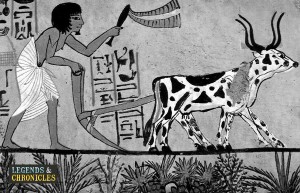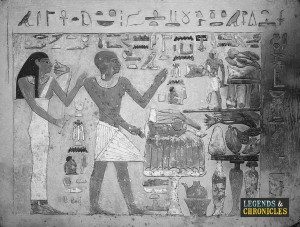Ancient Egyptian Men
Ancient Egyptian Men had certain privileges similar to most traditional societies, interestingly however, compared to other ancient societies of the time there was not a huge disparity between the status of Egyptian men and Egyptian women. Both the men and women of Egypt worked and earned wages regardless of their sex. Family life was important and there was a clearly defined social hierarchy. Men of lower ranking, however, had opportunities to rise in this hierarchy to the highest levels of the state, even though this was rare. Certain distinctions were retained between the common men and the men of nobility. For instance, there were separate schools for children hailing from nobility to ensure they received a superior education.
The history of the ancient Egyptian man can be traced back to pre-historic Egypt. The known history, however, begins with the unification of lower and upper Egypt and thus the formation of the kingdom in 3100 BC. The mass of the population of Egyptian men and women lived in the local villages. The bulk of the priests in the temples and nobles in the court also consisted of men, although women could also attain these ranks, even though it was rare. It was a custom for Egyptian men to follow the profession of their fathers. But this was not a strict rule and independent careers could be chosen should there be some luck or skill involved.
The Role in of Men in Ancient Egyptian Society
The role of ancient Egyptian men in society was not much different from the role of men in other societies of the time. A large section of Egyptian society was involved in agriculture, like all traditional societies, while many ancient Egyptian men also had roles in trade and commerce. It was expected of men to establish themselves in their career before seeking a wife. While women were free to keep property and had share in the inheritance, it was the role of ancient Egyptian men to administer that property. The class of priests and nobles was also mainly composed of Egyptian men.
Education in Egyptian Schools
Education of Egyptian boys was normally carried out in village schools which had a clearly defined curriculum. Subjects like mathematics, geography, history, and medicine were taught in these schools. After the age of about 14, most students adopted the professions of their fathers. However, some of the students also opted to go for specialised studies in various disciplines. For the children of Egyptian men of nobility, special schools called ‘the schools of the prince’ were established. It was also customary to receive advanced theological education called ‘Instruction of Wisdom’.
The jobs available to Ancient Egyptian men
The most common profession of Egyptian men was agriculture, with farming producing many spoils necessary for survival. Slaves worked on Egyptian men’s land and property and the property of their wives was also administered in a similar manner. Men and women could both work and generally earned equal wages. Other than agriculture, men of lower classes also weaved clothes and worked as slaves for the rich. Egyptian men from the upper classes typically worked in business and had government jobs which were befitting of their class. It was customary for ancient Egyptian men to adopt the profession of their fathers after coming of age. It was rare for women to take official duties in the government and therefore the administration was almost exclusively dominated by men.
Egyptian Men’s Clothing
Various changes in the clothing of ancient Egyptian men occurred from the inception of the Kingdom in 3100 BC till its downfall in 33BC. Garments were relatively basic in style during the days of the ‘Old Kingdom’ and during this period from around 2130BC, a wrap around skirt called the ‘Shendyt’ was in vogue. It was belted at the waist and sometimes pleated in the front. The skirt became longer during the time of the Egyptian Middle Kingdom around 1600BC. Another shift in the clothing of Egyptian men occurred around 1420BC when a light tunic or blouse with sleeves also became part of their clothing.
Ancient Egyptian Religion & The Gods
The religion of ancient Egyptian men was polytheistic with the roles of gods and goddesses clearly defined. The religion was mainly concerned with the relationship of the common people with the deities who were thought to be in control of the forces of nature. The Egyptians had clear concepts of afterlife with a specific set of rituals and prayers which were used to seek the help of Gods against everyday travails. During the New Kingdom, the famous Pharaoh Akhenaten made monotheism the official religion of the state with the worship of the sun god Aten. Some scholars consider this the first instance of monotheism in history.
Egyptian Male Customs
Like every society, ancient Egypt had its own customs, traditions, and festivals. Some of the most popular festivals in ancient Egypt included the Wag Festival, Sadj Festival, Sokar Festival, and the Flame Festival. Egyptian men actively took part in these festivals which were either reserved for gods or signified the beginning of the year or coming of spring. Another important festival was the Sed Festival which celebrated the continuation of the rule of the Pharaohs. Burial customs were also important, and included mummification of the dead bodies, casting of magic spells, and burying the dead with a copy of the Book of the Dead.
Famous Men in Egyptian History
There is a long list of famous ancient Egyptian men, mainly the great Pharaohs. The first king who unified the Lower and Upper Egypt around 3100 BC and laid the foundations of the First Dynasty was Narmer, who is also known as Menes. Pharaoh Khufu who built the Great Pyramid of Giza is particularly noteworthy among the famous men from Egypt. Among other famous Egyptians we can include Thutmose III often known as the Napoleon of ancient Egypt, Ramses the Great, and Akhenaten etc.
The Men of Ancient Egypt in Summary
The men of ancient Egypt had their traditionally defined roles and responsibilities in society. Just like other ancient societies, slavery was a custom but women enjoyed greater privileges in ancient Egypt compared to other societies of the same time. Egyptian men were the administrators at home as well as in society. They also administered the property of their wives, although the latter owned them. Other serious roles in society were also typically given to the men of ancient Egypt including the government jobs.

